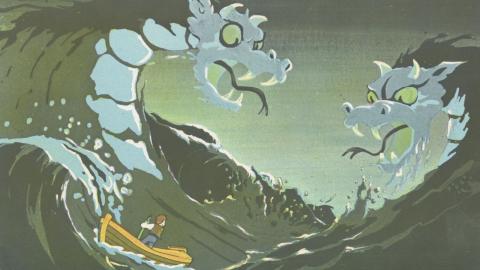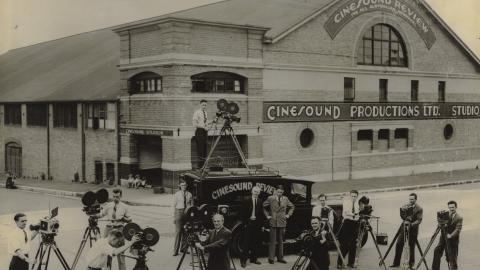

Drop-In Docos
Free weekend screenings of Australian documentaries
Aboriginal and Torres Strait Islander viewers are advised that this article contains names and images of deceased persons.
Every weekend, drop in for free documentaries in the NFSA Theatrette. Thought-provoking Australian documentaries will show on rotation each season, offering a window into key moments and conversations in our history and culture.
The Theatrette is the perfect place to spend a cosy morning or afternoon immersed in Australia’s audiovisual culture. Enjoy a coffee in the courtyard before or after the doco and discover other gems from the collection screening in the Mediatheque or on display in The Library, Kookaburra Room or in our Recent Relics installation. Explore what’s on offer in our heritage building.
Screenings are every Saturday and Sunday commencing at 11:00 am, 12:30 pm and 2:00 pm. You’re welcome to drop in at any time during the sessions. Entry is free and no bookings are required.
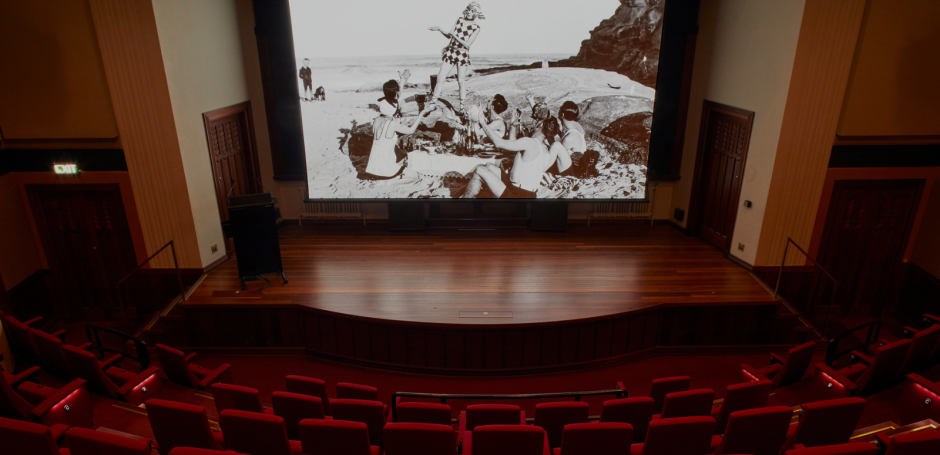
Summer Program – Summer of Love
This summer at the NFSA, we present a Summer of Love, channelling peace, love, music and the rebellious spirit of 1960s and ‘70s counterculture.
Step into a vibrant snapshot of Melbourne's experimental performing arts of the early 1970s with Pram Factory, and explore the radical music scene through early works from two of Australia’s most celebrated filmmakers: Peter Weir’s Three Directions in Australian Pop Music, capturing Melbourne’s TF Much Ballroom, and Phillip Noyce's Good Afternoon, filmed at the extraordinary Aquarius Arts Festival in Canberra.
The anti-Vietnam War protest movement of 1970 unfolds over 24 hours with Or Forever Hold Your Peace, while echoes of rebellion carried into the 1980s with Wildness, a stunning photographic record of Tasmania’s wilderness protests captured by photographers Olegas Truchanas and Peter Dombrovskis.
|
Saturday |
Sunday |
|
|
11:00 am |
Wildness |
Or Forever Hold Your Peace |
|
12:30 pm |
Celebrating the Newsreel Experience |
Celebrating the Newsreel Experience |
|
2:00 pm |
Three Directions in Australian Pop Music + Good Afternoon |
Pram Factory |
Wildness
2002 | Not Classified | 55 mins | AUS | D: Scott Millwood
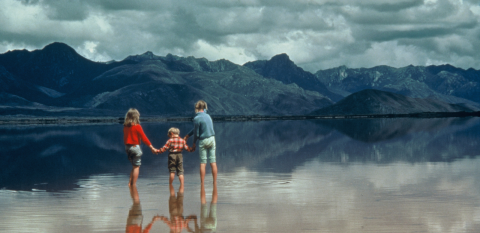
Olegas Truchanas and Peter Dombrovskis were pioneers of wilderness photography, their images becoming powerful symbols in campaigns to protect Tasmania’s natural heritage.
They shared many things, including a bond that was more like that of father and son. Both came from Baltic Europe and migrated to Tasmania, where their passion for nature became a crusade to save an environment under threat. Both died in the wild they loved, leaving a legacy of extraordinary images and a simple, effective philosophy: show people the beauty of Australia’s wilderness, and they might fight to save it.
A Film Australia National Interest Program in association with Big and Little Films. Developed with the assistance of the Australian Film Commission. Produced with the assistance of Film Victoria, Screen Tasmania and the Australian Broadcasting Corporation. © National Film and Sound Archive of Australia.
Celebrating the Newsreel Experience
1934–1941 I 53 MINS
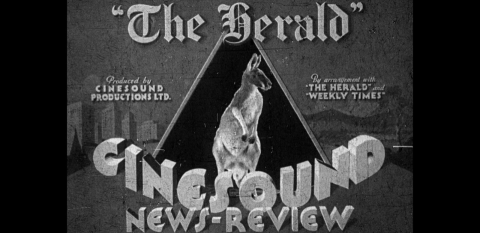
Before television, newsreels were Australians’ main window to the world. Screened in cinemas, these short films combined local and international stories with dramatic narration and vivid images, bringing national and global events to life.
Marking 50 years since the screening of Australia’s last newsreel in November 1975, this compilation recreates the experience of the newsreel theatrettes that once operated in capital cities and remained popular until the 1960s. These intimate cinemas offered continuous 80-minute programs on a loop – patrons could drop in, watch as much as they wished, and leave at any time.
Echoing that tradition, this showcase features Australian material from the mid-1930s to 1941, when newsreels were central to popular entertainment. Weekly programs typically combined five newsreels, two Australian and three international, with short subjects such as cartoons, comedies and travelogues.
NFSA Curator Jeffrey Wray worked with Ray Edmondson to select standout reels from the NFSA’s collection of more than 4,000 newsreels. Many benefited from Operation Newsreel, a major 1989 preservation effort and one of the largest corporately sponsored projects ever undertaken by a national memory institution.
Three Directions in Australian Pop Music
1972 | Not Classified | 11 mins | AUS | D: Peter Weir
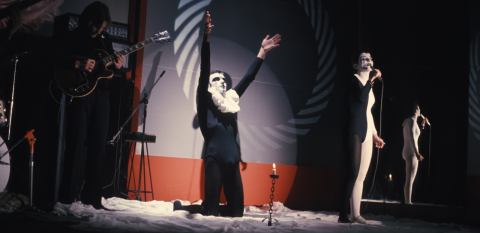
This short film directed by Peter Weir provides a glimpse into the thriving Australian pop scene of the early 1970s. It showcases one song each from three different bands during a live performance at the famous TF Much Ballroom, a music and cultural institution in Melbourne. The first song, ‘I Think of You’, showcases the theatrical rock style of Wendy Saddington and Teardrop, with the singer and a performance artist dressed as harlequins. Next up, the exuberant Captain Matchbox Whoopee Band plays ‘Who Walks in When I Walk Out’, delivering their unique brand of psychedelic jug-band sound. They’re followed by the experimental, progressive guitar rock group Indelible Murtceps with ‘A Song that I Know’.
An Australian Commonwealth Film Unit Production © National Film and Sound Archive of Australia.
Good Afternoon
1971 | G | 58 mins | AUS | D: Phillip Noyce
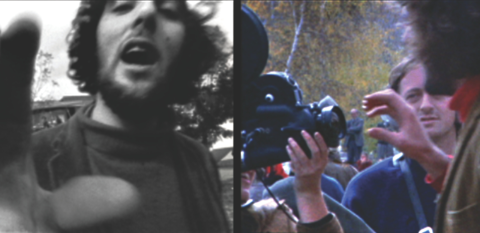
Contemporary filmmakers described Good Afternoon as 'a multiple screen, colour recreation of the incredible eight-day Aquarius Arts Festival held in Canberra, 1971. A radical new departure in documentary filmmaking; two screens bursting with pulsating images overpowering the mind as 10,000 young people and performers do their own thing amidst the antiseptic environment that is our capital city. Australia's counterculture at work and play. An important social document.' (Filmmakers Co-operatives Catalogue of Independent Film 1975–76)
Distributed by the National Film and Sound Archive of Australia © Phillip Noyce
Or Forever Hold Your Peace
1970 | Not Classified | 58 mins | AUS | D: Kit Guyatt, Chris McCulloch, Ian Dunlop, Brian Hannant, Arch Nicholson, Malcolm Smith, Richard Brennan, Doug White
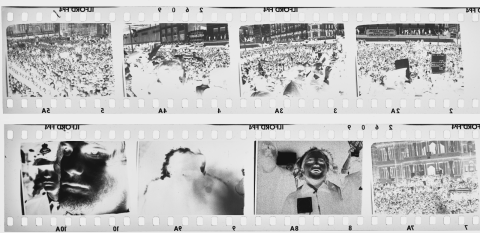
Filmed over a 24-hour period in May 1970, this observational documentary captures the Australian moratorium movement against the Vietnam War. Cutting between meetings, street protests, public speeches and concerts, and layered with audio from a range of sources, it offers an unfiltered view of the scale and passion of the growing opposition.
Presented without commentary, the film gives a great sense of the range, scale and passion of Australia’s opposition to the war. Remarkably, 132 filmmakers, including some of the leading directors and producers of the time, are credited with the production of this documentary.
© Richard Brennan.
Pram Factory
1994 | Not Classified | 56 mins | AUS | D: Anna Grieve, James Manche
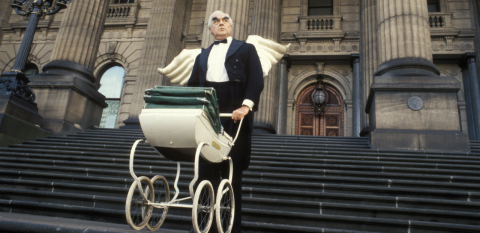
In the early 1970s, Melbourne became the stage for a cultural awakening led by the Australian Performing Group, a theatre collective that emerged as a hub for the city’s intellectual, artistic and political life. Operating from a converted factory known as the Pram Factory, they transformed the space into an icon of creative rebellion, laying the foundations for a renaissance in Australian theatre and culture.
© National Film and Sound Archive of Australia.
The National Film and Sound Archive of Australia acknowledges Australia’s Aboriginal and Torres Strait Islander peoples as the Traditional Custodians of the land on which we work and live and gives respect to their Elders both past and present.
